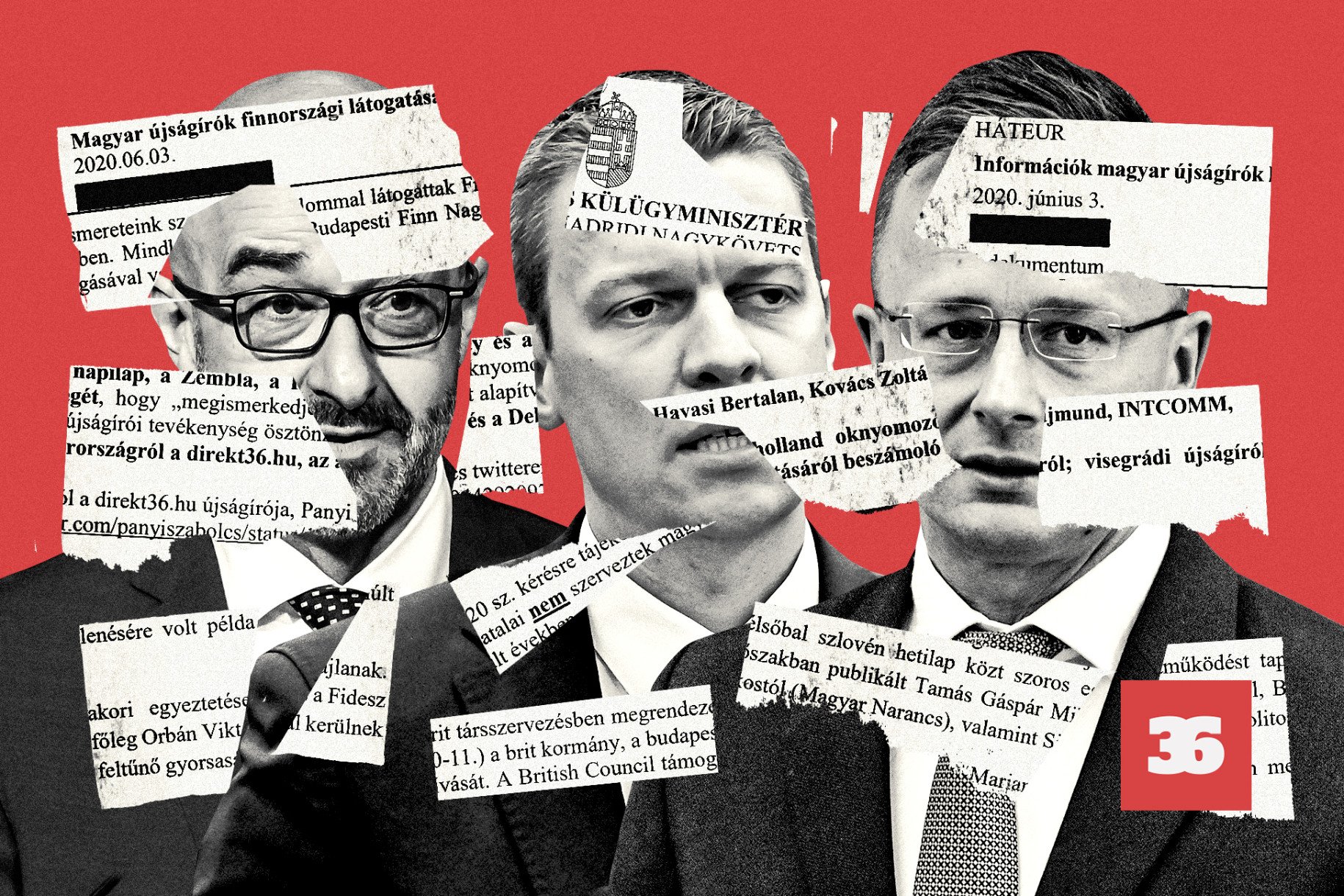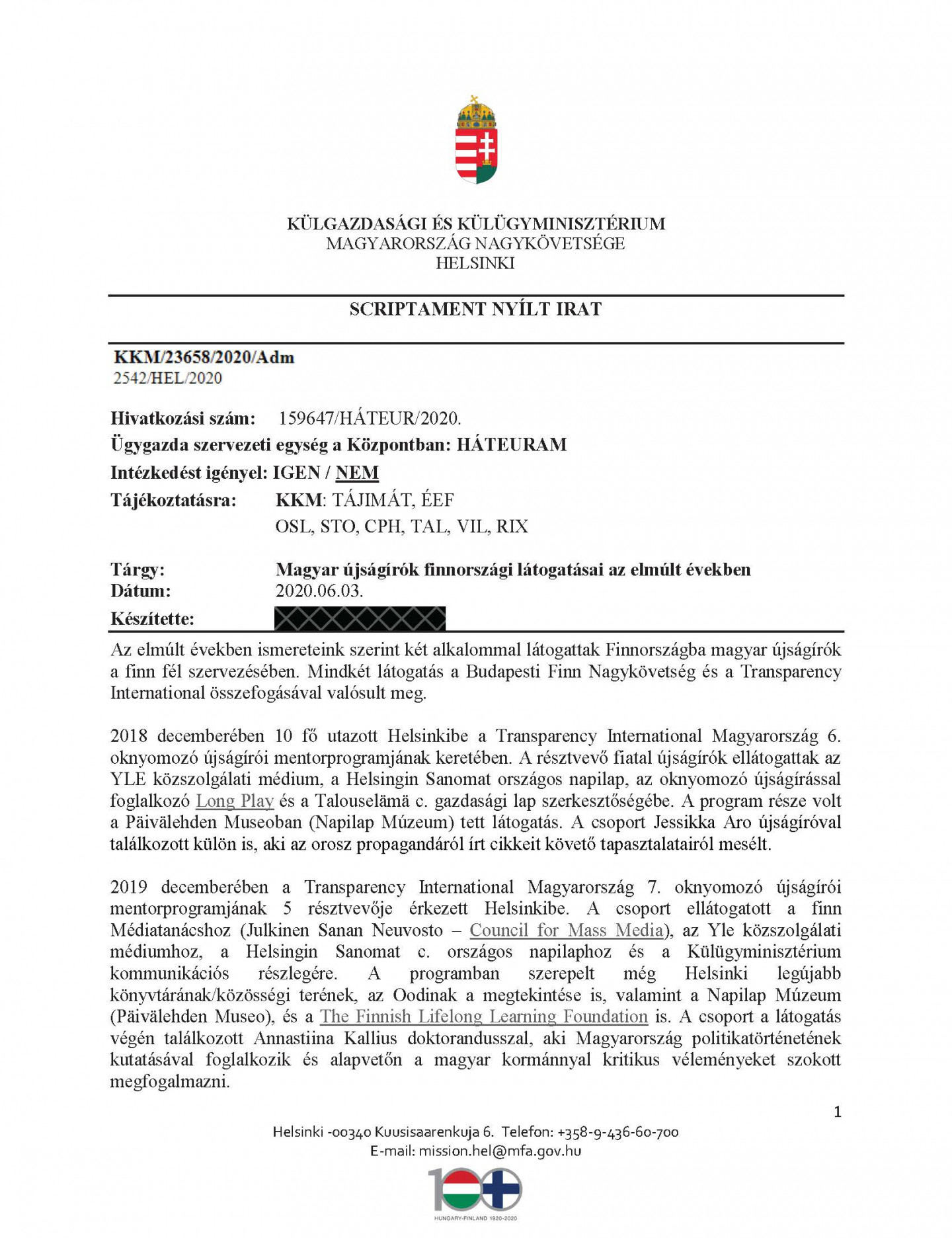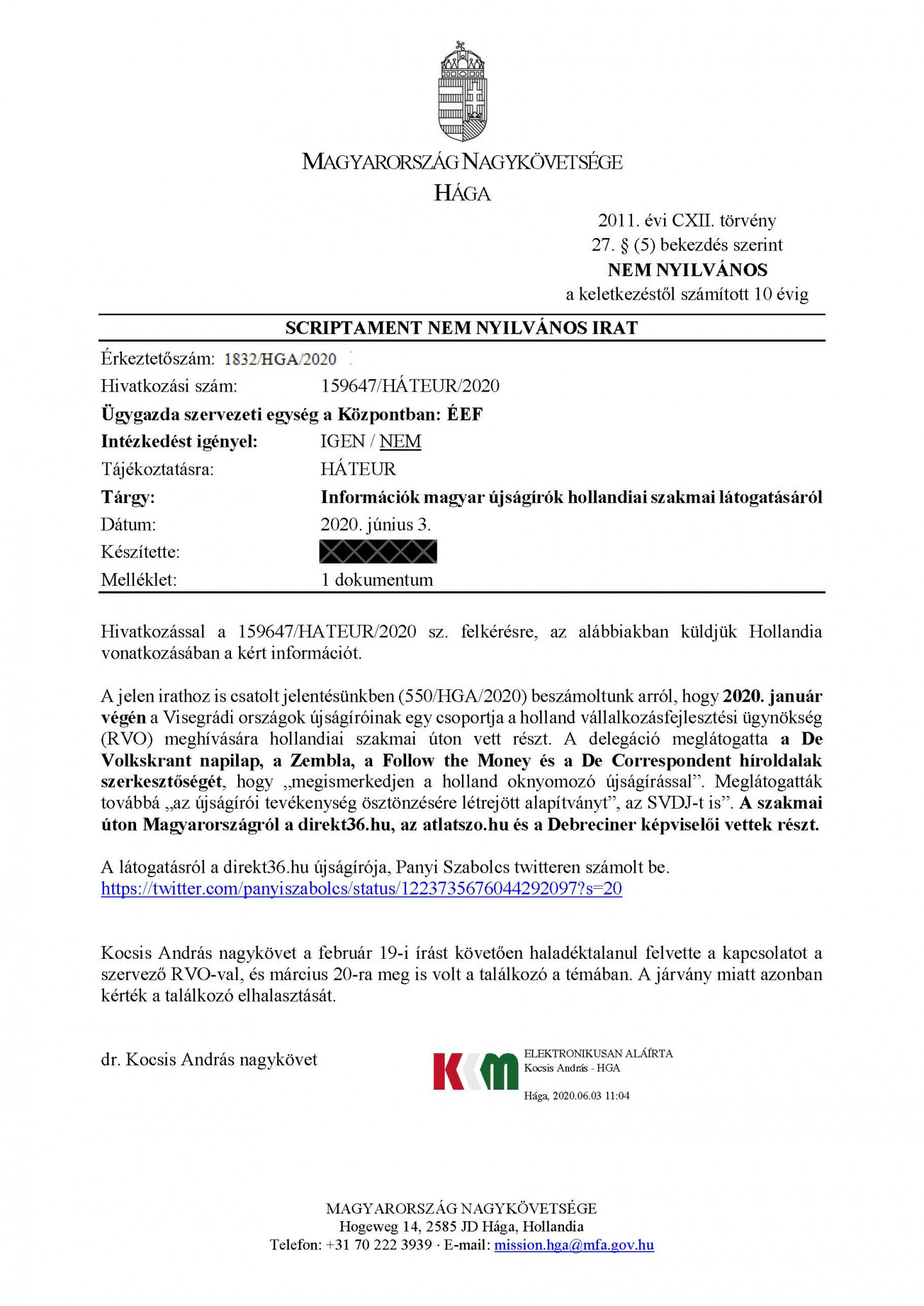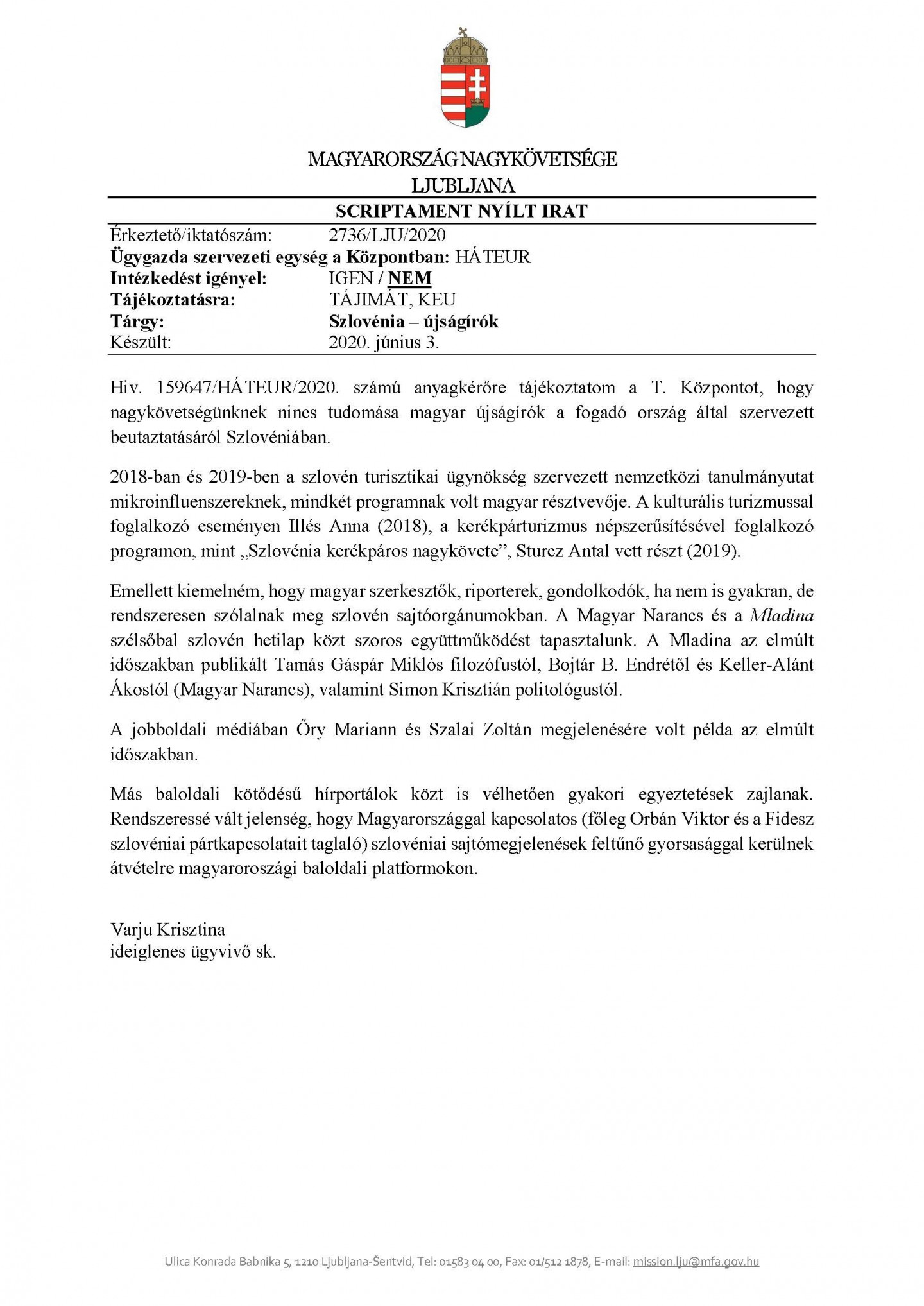Cables show how Orbán’s diplomats gather information on journalists

In December 2019 in Helsinki, five young Hungarian journalists and students interested in journalism took photos with Finnish cartoon characters called Moomins in the Finnish Public Media building, where they discussed, among other things, the differences between the situation of Finnish and Hungarian journalism. They also visited a Christmas market, a media museum, a library and the Finnish daily Helsingin Sanomat. Many of the young visitors had little experience of journalism and most of them were not even working as journalists at the time.
“Finland is a place where it’s really good to be a journalist”, one of the young journalists recalled about the three-day professional trip organised for them by the Finnish Embassy in Budapest.
But there was another report from the same trip. The Hungarian visitors were also closely followed at the Hungarian Embassy in Helsinki. A diplomatic cable sent by the Hungarian ambassador to Finland to Budapest on 3 June 2020 lists in detail where they went, and even notes that they met a Finnish PhD student who “is critical of the Hungarian government in fundamental ways”.

Cable from Helsinki
This cable is one of dozens of Hungarian diplomatic correspondences obtained by Direkt36 with the help of the Hungarian Civil Liberties Union (TASZ/HCLU) in the course of a freedom of information lawsuit. The cables reveal that Hungarian diplomats posted to European countries regularly monitor the activities of foreign newspapers reporting on the Orbán government’s affairs, gather information on the travels of independent Hungarian journalists, while actively facilitating the foreign visits of people associated with the pro-government media.
In the summer of 2020, the Ministry of Foreign Affairs and Trade (KKM/MFA), headed by Péter Szijjártó, instructed Hungarian embassies operating in the European Union to check whether the host country had organised professional visits, training courses or study tours for Hungarian journalists in recent years, and if so, “which Hungarian media representatives had participated in them and which newspapers and organisations in the host country had been visited”. This letter was obtained and published by Telex.
The letter, dated 2 June 2020, was signed by a MFA deputy state secretary, but the instruction was actually issued by Szijjártó’s confidant, Tamás Menczer, state secretary for information and international representation of Hungary. “I was just curious, because my job at the Foreign Ministry, for example, is to deal with political issues, and I consider it a political issue if George Soros is funding media courses for left-wing journalists (…) Some Soros organisations, such as Transparency International, organize such trainings. Professional trips! You don’t say!” – Menczer commented in an interview with ATV.
Transparency International Hungary responded to his statements by saying that the secretary of state had seriously misinformed the public, as the criticised study trips abroad were not organised for “left-wing journalists” but for students interested in journalism.
After Telex published Menczer’s letter and the secretary of state acknowledged its authenticity, Direkt36 requested all diplomatic cables written in response to the instruction from the MFA by means of a freedom of information request. The MFA refused our request, but after we filed a lawsuit with the help of HCLU, they first showed us several cables in a personal meeting and later gave them to us. According to the ministry, they only received replies from 11 Hungarian embassies in the 27-member European Union, namely Athens and Nicosia, Berlin, The Hague, Helsinki, Copenhagen, Ljubljana, Madrid, Paris, Warsaw, Zagreb – and London, which had just left the EU. We have not been able to verify the claim that these were the only embassies replying.
It is not the first time that the Hungarian state has shown deep interest in the activities of journalists. Last summer, Direkt36, a partner of the international journalism collaboration „The Pegasus Project”, revealed that journalists, photojournalists, media company owners critical of the government and even an expert who provided information to journalists had been targeted – and even proven to have been surveilled – in Hungary using an Israeli spyware called Pegasus.
Last year, Péter Szijjártó told the Parliament’s national security committee that “other countries are launching programs to support Hungarian media outlets”, and that these are “an attempt to interfere in Hungarian domestic politics”. As an example of foreign influence, Szijjártó also spoke about the fact that “certain embassies also support the reporting and publication of articles, and under such articles it is usually stated that the publication of the article was supported by this or that embassy”. The diplomatic cable from Helsinki also mentions that the program in question – Transparency’s mentor-mentee program for investigative journalists – has been supported by the Finnish, Swedish, Dutch, German and French embassies (Direkt36 journalists have participated in the program several times in recent years as mentors for young students.)
Based on the cables obtained by Direkt36 – which can be downloaded from here -, it appears that the information contained in these documents was gathered by diplomats of the Orbán government from social media profiles of journalists or online reports, among other sources. At the same time, diplomatic missions of several Western European countries have told us that Hungarian diplomats have personally asked them about programs organized for Hungarian journalists.
”The inquiry was informally couched on a one-to-one basis, with no details about its purpose,” an official from the embassy of one Western European country told Direkt36. “Had we known the wider context at the time, we would have likely expressed concerns via the appropriate channels,” the official added.
According to Emese Pásztor, Political Freedoms Project director at HCLU, which provided legal assistance in obtaining the documents, “the court case has shed light on how the machinery of discrediting journalists works – how government officials gain ammunition for personal attacks on journalists while publicly trying to stigmatise independent journalism as a national security risk.”
The Hague: ‘We sent background information on the journalist who planned to interview State Secretary Zoltán Kovács’
According to the cables, the Hungarian Embassy in The Hague is far and away the most prominent in monitoring the activities of journalists – Hungarian and foreign – who are considered critical of the government. The MFA has provided Direkt36 with two cables from The Hague, which show that the Orbán government is also interested in the travels and programs of journalists considered critical of the government at higher levels. For example, a cable from February 18, 2020, sent by the Hungarian ambassador in The Hague, was not only sent to recipients within the Ministry of Foreign Affairs, but also to Viktor Orbán’s spokesman, Bertalan Havasi, and to Zoltán Kovács, the state secretary for international communications.
This is a report on a visit organised by the Dutch state for Czech, Polish, Hungarian and Slovak investigative journalists, and attended by Hungarian reporters of Átlátszó.hu, Debreciner.hu and Direkt36 (the author of this article). The Hague cable lists the Dutch newsrooms visited by the journalists and briefly describes these Dutch newspapers, with a special focus on the topics they write about that are unpleasant for the Orbán government.

One of the diplomatic cables from The Hague
The cable also reveals that Hungarian diplomats in The Hague have been thoroughly researching specific Dutch journalist. For example, when writing about Dutch weekly De Groene Amsterdammer, the cable notes that a few weeks earlier, “we sent background information on the magazine and on the journalist Marijn Kruk, who was planning to interview Mr. State Secretary Zoltán Kovács”.
Kruk told Direkt36 that he is not particularly bothered by the fact that Hungarians are gathering information about him, but referring to the Pegasus spyware surveillances in Hungary, he added, “that is until they hack my mobile phone”. He also told that Kovács, and even some other pro-government figures sat down to talk to him for his forthcoming article. Kruk said they could have been collecting information on him because “they define themselves as representatives of an ideology, and for them I am an ideological opponent, or even enemy. When someone writes for a newspaper like mine, the logical thing (for the Hungarian government) is to get to know your enemy first”.
Kruk is not the only Dutch journalist mentioned by name in the report. In the case of the Dutch investigative site Follow The Money, the cable details the funding background of the site, and points out that “one of the founders of the portal and its editor-in-chief is Eric Smit, who encouraged MEP Judith Sargentini to spit on Viktor Orbán on a Dutch public radio show on April 14, 2018”. It also turns out that the embassy had previously taken Smit’s statements seriously, with two cables devoted to them in 2018. (Ambassador András Kocsis has also been active in the public sphere. According to Hungarian pro-government weekly Figyelő’s report at the time, the ambassador “strongly rejected the statement, finding it outrageous and criminal. He also asked the Dutch broadcaster what disciplinary measure they planned to take against the rude journalist.”)
The Hungarian ambassador concludes the February 2020 cable by writing that the Dutch government will soon organise a professional trip not only for investigative journalists but also for representatives of NGOs, and that he will contact the Dutch program organizer immediately.
The second cable from The Hague, sent on 3 June, is much shorter and basically just refers back to this trip for the investigative journalists. It underlines which newsrooms were visited by the delegation and that “representatives of direkt36.hu, atlatszo.hu and Debreciner from Hungary took part in the professional trip”. The report links to a Twitter post by Direkt36’s journalist (the author of this article), which includes photos of the visits to the Dutch newsrooms. This second cable also reveals that despite Ambassador Kocsis requested a meeting with the Dutch organisers ”without delay”, it was postponed due to the pandemic situation.
Ljubljana: “There is presumably frequent coordination between news sites with left-wing affiliations”
Although Menczer’s instruction only asked about trips and official programs organized for Hungarian journalists by foreign governments and state bodies, there were embassies where the instruction was interpreted more broadly. For instance, the document from the Slovenian capital Ljubljana speculates on the possible links of local media critical of the Orbán government with Hungarian journalists and newspapers.
The cable of 3 June 2020 details that they experience a close cooperation between Mladina, which is described as a “far-left Slovenian weekly”, and Hungarian weekly Magyar Narancs, as “Mladina has recently published articles by philosopher Gáspár Miklós Tamás, Endre Bojtár B. and Ákos Keller-Alánt (Magyar Narancs), and political scientist Krisztián Simon”. According to the author of the Ljubljana cable, there is also “presumably frequent coordination” between other “left-wing affiliated” media outlets too, which the diplomat concludes from the fact that topics about Prime Minister Viktor Orbán and Fidesz’s party connections in Slovenia are being covered “with striking speed” by “left-wing platforms in Hungary”.

Cable from Slovenia
Endre Bojtár B., the editor-in-chief of Magyar Narancs, told us that he never would have imagined that Hungarian state bodies could monitor the relationship between his weekly and Mladina, “but I’m not really surprised”. According to Bojtár B., Mladina is “a great magazine and one of the legends of Central Eastern European press” (which he says is nonsense to describe as far-left), so he is proud that they are connected, even if sporadically.
Bojtár B. added that it is only in the universe created by the Hungarian government “that it can be strange that journalists of different nationalities talk to each other, even write articles for each other’s papers or give comments to each other, or that Hungarian magazines quote Hungary-related news from foreign, sometimes Slovenian, papers”.
Mladina has already become a target of criticism from the Orbán government in 2019, when the weekly devoted a special issue to how Orbán and Hungarian businessmen close to him are infiltrating Slovenian domestic politics and, through various media acquisitions, gaining increasing influence over Slovenian media. To illustrate this, Mladina ran a cartoon on its front page in which Viktor Orbán is making a Nazi salute while surrounded by Slovenian right-wing figures.
Subsequently, the Hungarian government sent a diplomatic note to the Slovenian Foreign Ministry via the embassy in Ljubljana, asking for action to be taken “to avoid similar incidents in the future”. The Slovenian foreign ministry rejected this, saying that they “strictly respect the freedom of the speech and freedom of the press and would never interfere in any of the media’s editorial policy.” According to Mladina’s article, they were later attacked by Hungarian government spokesman Zoltán Kovács as well as by Slovenian right-wing media outlets under Hungarian influence.
While the Hungarian Embassy in Ljubljana speculates about cooperation between media outlets considered left-wing, the Hungarian pro-Orbán media empire is expanding in Slovenia in a well-documented way. In autumn 2020, for example, the pro-government TV2 Group bought Slovenian Planet TV, and in February this year a company with ties to Lőrinc Mészáros bought Radio City in Maribor, one of Slovenia’s leading radio stations. However, the diplomatic cable only briefly touches on the relationship between the Hungarian and Slovenian right-wing media, mentioning that the head of Magyar Hírlap’s foreign policy desk and the editor-in-chief of Mandiner were featured in Slovenian media.
Madrid: “In his capacity as editor-in-chief, he requested the cooperation of the Consulate General in Barcelona”
The vast majority of diplomatic cables obtained by Direkt36 state that the host country either did not organize any study trips for Hungarian journalists (Berlin, Copenhagen, London, Madrid, Warsaw, Zagreb) or only on politically neutral topics (Ljubljana, Athens-Nicosia, Paris, London). In other words, the responses do not support Szijjártó and Menczer’s assumption that there is any significant “foreign interference”.
The Athens embassy cable, for example, describes that no such study tours have been conducted in Greece, and that journalists from tourism and lifestyle magazines are the main regular visitors to Cyprus, “although journalists from political newspapers have also taken part in some study trips”, the cable adds. The embassy has also included a list of several pages on what outlets have sent journalists to these trips between 2003 and 2019.
However, there are other cables that show that some Hungarian embassies are actively assisting pro-government media representatives while monitoring the trips of independent journalists and journalists critical of the government.
The Warsaw embassy reports that, although they cannot report on any similar trips requested in the instructions, “our embassy has on several occasions assisted (when requested) journalists who came here on behalf of their editorial staff”. The embassy’s cable in Zagreb highlights that the heads of the Nézőpont Group, which also provides public opinion research and media monitoring services to the Orbán government, had an “informal networking discussion in Zagreb in 2018 to review developments in Croatian domestic politics and the media market”.
The Madrid embassy report clearly indicates that their diplomats arranged for Hungarian pro-government journalists to be received at the offices of the Spanish national sports daily Mundo Deportivo. “Ambassador György Szöllősi, in his capacity as editor-in-chief of Nemzeti Sport [National Sport, a Hungarian pro-government sports daily], requested the cooperation of the Consulate General in Barcelona to organize a professional visit for sports journalists, which took place in Barcelona in the second half of 2018,” the report says.


